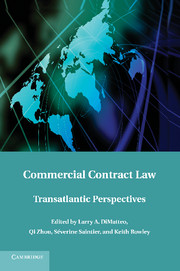Book contents
- Commercial Contract Law
- Commercial Contract Law
- Copyright page
- Dedication
- Brief Contents
- Contents
- Contributors
- Foreword
- Part I The Role of Consent
- Part II Normative Views of Contract
- Part III Contract Design and Good Faith
- Part IV Implied Terms and Interpretation
- Part V Policing Contracting Behavior
- 12 The Paradox of the French Method for Calculating the Compensation of Commercial Agents and the Importance of Conceptualising the Remedial Scheme under Directive 86/653
- 13 Unconscionability in American Contract Law
- 14 Unfair Terms in Comparative Perspective
- 15 (D)CFR Initiative and Consumer Unfair Terms
- Part VI Misrepresentation, Breach, and Remedies
- Part VII Harmonizing Contract Law
- Index
15 - (D)CFR Initiative and Consumer Unfair Terms
from Part V - Policing Contracting Behavior
Published online by Cambridge University Press: 05 February 2013
- Commercial Contract Law
- Commercial Contract Law
- Copyright page
- Dedication
- Brief Contents
- Contents
- Contributors
- Foreword
- Part I The Role of Consent
- Part II Normative Views of Contract
- Part III Contract Design and Good Faith
- Part IV Implied Terms and Interpretation
- Part V Policing Contracting Behavior
- 12 The Paradox of the French Method for Calculating the Compensation of Commercial Agents and the Importance of Conceptualising the Remedial Scheme under Directive 86/653
- 13 Unconscionability in American Contract Law
- 14 Unfair Terms in Comparative Perspective
- 15 (D)CFR Initiative and Consumer Unfair Terms
- Part VI Misrepresentation, Breach, and Remedies
- Part VII Harmonizing Contract Law
- Index
Summary
This chapter will examine the development, current state and coherence of initiatives aimed at advancing the harmonisation of European private law, initiatives which are traced back to the European Union Commission’s 2001 Communication on Contract Law. In this regard the broadly cast ‘academic’ Draft Common Frame of Reference (DCFR) initiative, the emergent, more focused Common Frame of Reference (CFR) and the ‘optional instrument’ developed under the auspices of the ‘Expert Group,’ as well as the evolution of proposals for the Consumer Rights Directive are initiatives which are, at times, contradictory. The chapter focuses on the contradictions among these different initiatives, as well as inconsistencies within the initiatives.
Given the fragmentation of private law that has always accompanied the process of Europeanisation, and the underlying controversy surrounding EU competence to launch a programme of private law consolidation, the chapter considers more modest and more imaginative initiatives. In particular, issues in consumer protection are analysed by examining the adequacy of traditional standards and mechanisms of protection. The chapter argues that the dissonance within harmonisation discourse is significant and that greater circumspection is called for in terms of the EU’s competence to legislate in this area. It concludes by offering recommendations as to which areas of private law can be realistically consolidated.
- Type
- Chapter
- Information
- Commercial Contract LawTransatlantic Perspectives, pp. 366 - 382Publisher: Cambridge University PressPrint publication year: 2013
- 2
- Cited by



